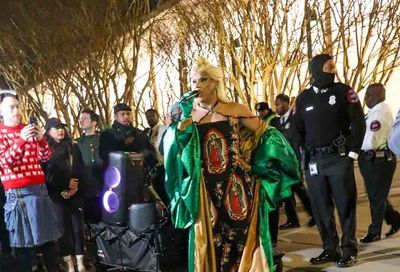Mitch McConnell: “President Trump’s nominee will receive a vote.”
Senate Majority Leader Mitch McConnell wastes little time pronouncing, on the eve of her death, that there will be a Senate vote to replace Justice Ginsburg


The timing of when the successor to Supreme Court Justice Ruth Bader Ginsburg, who died at the age of 87 on Friday, Sept. 18, 2020, can be named is likely to be a sticking point between the two parties. When former Supreme Court Justice Antonin Scalia passed away in 2016, while Barack Obama was still in the White House, Republicans refused to confirm his nominee, Merrick Garland, on the grounds that the American people would be able to weigh in — by supporting either a Democratic or Republican president — in the November election that year.
In 2016, Republicans insisted on enforcing the so-called “Biden Rule” — referring to a 1992 speech given by then-Sen. Joe Biden in which Biden, now the Democratic Party’s official nominee for president, said that President George H.W. Bush should either wait until after the election to appoint a potential successor, or should nominate a moderate who would be acceptable to the Democratic majority, if there was a vacancy on the court.
At the time Biden was gave his speech, there was no vacancy on the Supreme Court, nor did one open up at any time during that presidential election year. Biden, who in 2016 was Vice President, insisted that naming a nominee who would be acceptable to Republicans — in this case, Garland, who was viewed with distrust by the Democrats’ progressive wing — was not inconsistent with the standards outlined in his speech.
Even though fact-checkers later noted that the Senate never adopted the “Biden Rule”, nor did Biden object to nominating “compromise” nominees after the 1992 election, talking points misquoting Biden or misrepresenting his positions were trumpeted and regurgitated on right-wing news outlets, erasing any nuance that may have existed in the former Vice President’s position.
If one applies the standard set forth by Senate Majority Leader Mitch McConnell (R-Ky.) in 2016, then no nominee of the incumbent party should be named as a potential Supreme Court nominee during an election year. However, Democrats have long been suspicious that Republicans will reverse themselves and rapidly confirm a conservative nominee to swing the court in their favor.
Mindful of this dynamic, as well as the enticing opportunity her death would provide for social conservatives, Ginsburg dictated a statement to her granddaughter, Clara Spera, just prior to her death, saying “My most fervent wish is that I will not be replaced until a new president is installed.”
However, Senate Majority Leader Mitch McConnell has already issued a statement on Ginsburg’s death, concluding it with the words: “President Trump’s nominee will receive a vote on the floor of the United States Senate.”
In order to block a vote on any nominee, Democrats would have to ensure every member of their caucus refuses to proceed with a confirmation vote, and would have to pick up the votes of four Republicans who feel that reversing course from 2016 would be hypocritical or bad politics. Already, U.S. Sen. Lisa Murkowski (R-Alaska) has vowed not to confirm a new Supreme Court Justice until after Americans have decided who their president will be, though that leaves her some wiggle-room for confirming a compromise nominee after the election, especially if Biden defeats President Donald Trump in the presidential race.
Let me amend that. She said she wouldn't confirm until after Americans decide who their president will be. Stay tuned for @kcgrove story @AKPublicNews
— Liz Ruskin (@lruskin) September 19, 2020
Sen. Susan Collins (R-Maine), facing a tough re-election bid, told Jonathan Martin of The New York Times earlier this month that she does not favor appointing a Supreme Court nominee before the election, and would not favor appointing a Trump nominee in the lame-duck session stretching from November to January if there is a party change in the presidency.
News: @SenatorCollins told me earlier this month in Maine that she would not seat a Supreme Court justice in October.
“I think that’s too close, I really do,” she said.
She said she’d also oppose seating a justice in the lame duck if there’s a change in presidents.
— Jonathan Martin (@jmartNYT) September 19, 2020
Sen. Chuck Grassley (R-Iowa), the former Chairman of the Senate Judiciary Committee, said in 2018 that he wouldn’t support confirming a Supreme Court nominee if a vacancy opened up in 2020, on the grounds that it would conflict with the position he took in 2016 to block Garland’s nomination to the court.
However, Grassley has since been replaced as chairman by Sen. Lindsey Graham (R-S.C.). Graham previously said during a 2018 appearance at The Atlantic Festival that “if an opening comes in the last year of President Trump’s term, and the primary process is started, we’ll wait until the next election.” But some Democrats worry that Graham, who is an ally of Trump’s and who needs to shore up support among conservatives as he faces a tight race against Democrat Jaime Harrison this year, may walk back his earlier comments.
Sen. Lindsey Graham — who chairs the committee that would consider a Supreme Court nomination — in 2018: "If an opening comes in the last year of President Trump’s term … we’ll wait 'til the next election." pic.twitter.com/7tjuqFCcLy
— The Recount (@therecount) September 19, 2020
Related:
Ted Cruz, Tom Cotton, and other anti-LGBTQ figures top Trump’s list of potential Supreme Court picks
Supreme Court says religious schools can fire LGBTQ employees despite nondiscrimination laws
Read more:
Lesbian North Dakota alderwoman defends decision to fly Pride flag in Minot
Maryland man who pleaded guilty to killing transgender woman gets 35 years in prison
Pete Buttigieg endorses 54 Democrats seeking office this November
Support Metro Weekly’s Journalism
These are challenging times for news organizations. And yet it’s crucial we stay active and provide vital resources and information to both our local readers and the world. So won’t you please take a moment and consider supporting Metro Weekly with a membership? For as little as $5 a month, you can help ensure Metro Weekly magazine and MetroWeekly.com remain free, viable resources as we provide the best, most diverse, culturally-resonant LGBTQ coverage in both the D.C. region and around the world. Memberships come with exclusive perks and discounts, your own personal digital delivery of each week’s magazine (and an archive), access to our Member's Lounge when it launches this fall, and exclusive members-only items like Metro Weekly Membership Mugs and Tote Bags! Check out all our membership levels here and please join us today!























You must be logged in to post a comment.